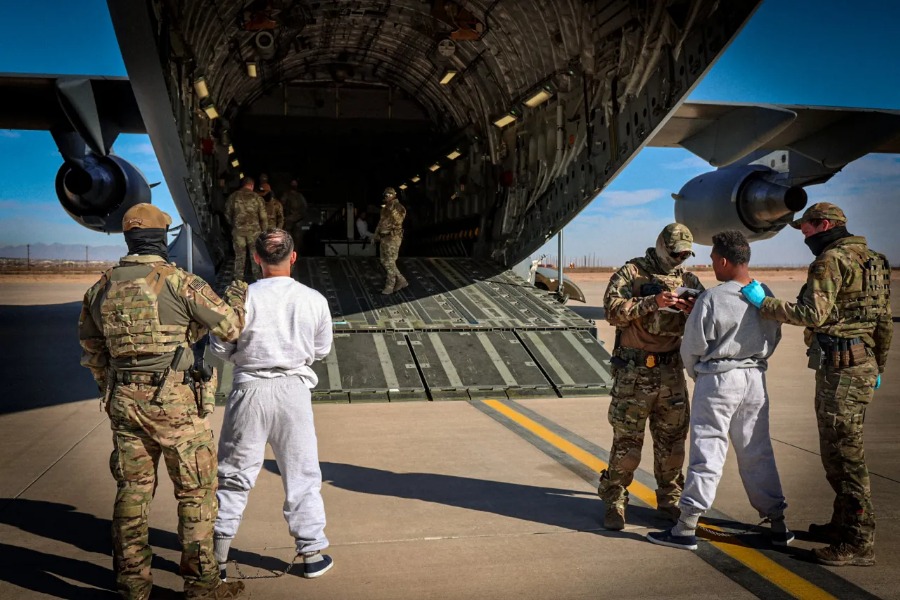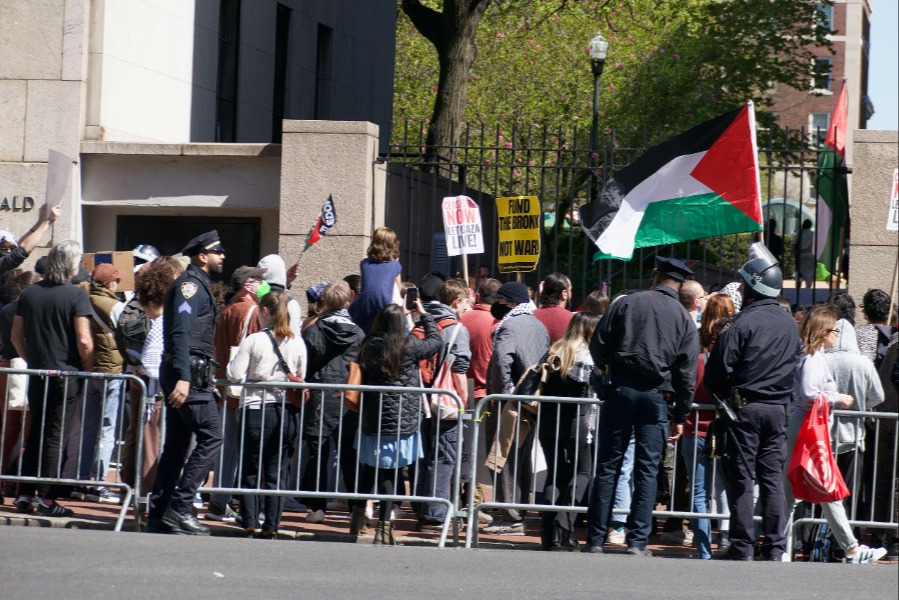A Fork in the Road for Trump’s Domestic Use of the Military
As details about migrant detention at Guantanamo Bay trickle in, the Defense Department’s role in immigration enforcement appears to be at an inflection point.

Published by The Lawfare Institute
in Cooperation With

The first 24 hours of Donald Trump’s presidency revealed the range of legal theories he would contemplate to justify using the military for immigration enforcement. Some of these legal theories recycled statutory emergency authorities exercised across much of the 21st century. Others were extraordinary and clearly unfounded—rooted in uses of the Alien Enemies Act and purported inherent constitutional authorities.
The key question in the weeks that have followed is how far, and how fast, Trump would move toward these extraordinary and unfounded legal theories. The Defense Department’s first additional border deployment relied on tried-and-true, non-emergency statutory authorities. A growing constellation of developments over the weeks that have followed, however, suggest that the administration has real appetite for acting on much more aggressive legal theories. The steady drip of details about migrant detention in Guantanamo Bay offers a chance to observe this shift in real time. Simultaneously, the cohort of Senate-confirmed legal and policy advisers to the president has come into sharper focus. And there is little reason to believe they intend to dissuade the president from taking aggressive action.
On Jan. 29, Trump directed the secretaries of defense and homeland security to expand the capacity of the Migrant Operations Center. The Migrant Operations Center is a decades-old facility designed to temporarily hold migrants interdicted in the Caribbean before their extradition to a third country. Yet, despite its long history, there is little publicly available information about its legal underpinnings. Most of what we know indicates that the transport and detention of migrants is a Department of Homeland Security (DHS), not Defense Department, operation. The New York Times reports, and the Defense Department has confirmed, that Immigration and Customs Enforcement agents “have been holding the first detainees.” A key military commander at Guantanamo Bay similarly stated that military operations are “in support of DHS,” and at least two other U.S. Southern Command press releases have been couched in terms of support to DHS.
Yet I can find no public statement from DHS articulating the legal basis for what Defense Secretary Pete Hegseth concedes may be an extended detention. There has likewise been no indication from the Defense Department of the legal basis on which it is providing support to DHS. Nor is it entirely clear what the extent of this support will be. The Defense Department routinely supports other agencies by providing vacant barracks and land for non-Defense Department activities. It did so on a similarly large scale during the initial response to the coronavirus pandemic and after the airlift of tens of thousands of evacuees from Afghanistan. In both of these situations, however, the Defense Department clearly indicated that it was supporting other federal agencies pursuant to a request for assistance based in the Economy Act. The Economy Act is a straightforward statute—one agency is authorized to provide goods or services to another on a reimbursable basis to advance the missions of the requesting agency. The Defense Department has made no similarly direct statement about the nature of current support at the Migrant Operations Center. Indeed, the New York Times reports that it is not clear what agency is financing any of the substantial increase in logistics at the Migrant Operations Center or how it is doing so.
This silence is concerning in light of other indications about the scope of direct military involvement in operating this detention facility. The first group of migrants sent to Guantanamo Bay are being housed not in the Migrant Operations Center, but in the section of the base designated for law of war detainees. New York Times reports, furthermore, contain pictures showing “Marines practic[ing] on each other the process of taking a migrant from a bus to their tent.” These Marines are themselves detaining the migrants, with apparently no intended role for federal law enforcement. This planning contradicts the sharp limits we have been told pertain to military interaction with migrants on Defense Department-run deportation flights.
This type of direct law enforcement activity is precisely of the kind foreclosed by the Posse Comitatus Act—a limitation affirmed by Trump’s own Office of Legal Counsel during his first administration. The Posse Comitatus Act, however, is riddled with loopholes. Since 1989, for example, the Department of Justice has held that the Posse Comitatus Act does not apply extraterritorially. But whether Guantanamo Bay should be considered “extraterritorial” for Posse Comitatus Act purposes is far from clear—even just in the context of this operation. As Jonathan Hafetz and Rebecca Ingber have noted, one of the only obvious authorities for DHS to detain these migrants is a provision of the Immigration and Nationality Act, which authorizes their detention prior to removal from the United States. Is the administration considering Guantanamo Bay extraterritorial for Defense Department purposes, but domestic for DHS purposes?
These questions only scratch the surface of the legal complexities that involve any detention at Guantanamo Bay. Again as Ingber and Hafetz have noted, the Supreme Court has held that law of war detainees at Guantanamo Bay have habeas rights even if they never transit U.S. territory. And as Steve Vladeck has explained, migrants moved from the mainland United States to Guantanamo Bay certainly enjoy a number of due process protections under the Fifth Amendment. It is not surprising, therefore, that a district court judge recently enjoined DHS from removing a group of Venezuelan migrants who believed they were in danger of being transported to the Migrant Operations Center. Guantanamo Bay, especially for migrants previously held in the United States, does not exist outside the law. Indeed, its unique legal status may complicate the U.S. government’s detention more than a similar detention would at a military installation on U.S. soil.
Other practice-based exceptions to the Posse Comitatus Act beget even more questions. Since 1977, the Office of Legal Counsel has argued that the Posse Comitatus Act “does not prohibit military personnel from acting upon [on-]base violations committed by civilians.” But the rationale for this exception was quite nuanced. The Office of Legal Counsel argued that the act was not intended to prohibit using the military for law enforcement purposes in areas under military control operating under the laws of war (i.e., areas governed by military, not civilian, law). A later Office of Legal Counsel opinion expanded on this authority by indicating that it included the ability to “apprehend and restrain [Cuban parolees] for on-base violations of federal and state law which in the case commander’s view threaten the security and good order of the base.” While this might comfortably include using the military for perimeter security at the Migrant Operations Center, it seems hardly consistent with these opinions to include ongoing detention as migrants move through the center.
Hegseth has called the operation at Guantanamo Bay a “plan in movement.” The plan is moving quickly. U.S. Southern Command reports that 150 service members are already at Guantanamo Bay solely to support this operation. A contingent of Navy engineers, medical personnel, and military police are also reported to already be assisting (it is unclear whether they are part of this 150 figure or additional). Again, what is the legal basis for these additional active-duty deployments? And what are the lines between the security responsibilities of the Defense Department and DHS? These questions are important not only to understand whether the due process rights of those detained are being respected. They are also important to understanding whether the administration is already resorting to extraordinary legal theories for this ongoing military operation.
All of which brings me to the second source of concern—the slate of appointees who will be (or are already) essential to adjudicating these legal questions. Jack Goldsmith and Bob Bauer have argued that a possible (perhaps likely) explanation for the many facially illegal executive orders we have seen over the past three weeks is simply that senior administration officials may not care about compliance with the law. The vice president certainly added fuel to this fire when he argued that “[j]udges aren’t allowed to control the executive’s legitimate power.” Even more concretely, Goldsmith and Bauer cite the views of Trump’s director of the Office of Management and Budget, Russell Vought. Vought, among a litany of other statements, has argued that “I don’t want President Trump having to lose a moment of time having fights in the Oval Office about whether something is legal.”
Vought’s maximalist views on presidential authority mirror Hegseth’s maximalist views on the Defense Department’s role in immigration enforcement. Hegseth has stated, for example, that “[a]ny assets necessary at the Defense Department to support the expulsion and detention of those in our country illegally [are] on the table, to include—as has been widely reported—Guantanamo Bay.” And he has spoken about deportation less in terms of support to DHS and more in terms of Defense Department responsibility to “defend the sovereignty of our southern border.”
These early moves by the Trump administration make the nominee for Defense Department general counsel vitally important. On Feb. 3, the administration made public the nomination of Earl Matthews. Although there is little about Matthews’s legal views that is publicly available, the tenor of his public statements writ large has been concerningly political. He has alleged, for example, a conspiracy by senior Defense Department leadership across the Trump and Biden administrations to lie about their actions to delay the D.C. National Guard from defending the Capitol during the Jan. 6 insurrection. What’s more, in testimony before the House, Matthews argued that former Rep. Liz Cheney (R-Mont.), as co-chair of the first Jan. 6 committee, “had a singular and unremitting focus and his initials are Donald John Trump.” He also testified that the Jan. 6 committee “knew that General Flynn was being untruthful, but excused and overlooked his lack of candor because the Select Committee was squarely focused on matters it believed would embarrass or incriminate President Trump.” These kinds of allegations, and this kind of rhetoric, from a nominee for Defense Department general counsel is practically unheard of.
Less than a month into the second Trump presidency, there are multiple concerning indicia of legal process that make the most extreme options for using the military for immigration enforcement much more likely. As I noted in Lawfare previously, these options include implausible readings of the Alien Enemies Act and invocations of presidential constitutional authority unheard of in at least a century. They also put squarely in the realm of possibility using the military to strike at Mexican drug cartels in a manner examined (and critiqued) by Ashley Deeks and Matthew Waxman over a year ago. The upcoming weeks will be crucial in determining the course of military participation in immigration enforcement.





